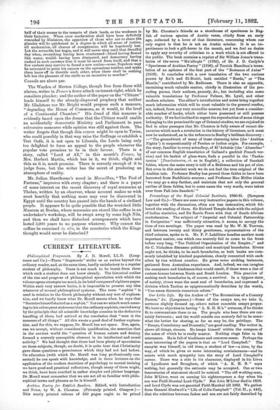by Mr. Clouston's friends as a storehouse of specimens in
Eng- lish of various species of Arabic verse, chiefly from an early age, collected by a lover of that literature, concerning whom our only regret is that he is not an Arabic scholar. It is an im- pertinence to look a gift-horse in the mouth, and we feel no desire to apply any severity of criticism to a work which is not offered to the public. The book contains a reprint of Sir William Jones's trans- lation of the seven "Ma'allaqitt " (1782), of Dr. J. D. Carlyle's "Specimens of Arabian Poetry" (1796), of Terrick Hamilton's trans- lation of an epitome of the first part of the "Romance of Antar" (1819). It concludes with a new translation of the two curious poems by Ka'b and El-Bdslri, both entitled "Bards," or "The Mantle," contributed by Mr. Redhouse. There is also an appendix, containing much valuable matter, chiefly in illustration of the pre- ceding poems, their anthers, prosody, &c., but including also some valuable translations by Professor Palmer, Mr. Lyall, and other modern scholars. The editor's introduction and notes bring together• much information which will be most valuable to the general reader,. not, indeed, from any very recondite sources, but yet from a consider- able number of books, which either have possessed or still possess authority. If we feel inclined to regret the reproduction of some things belonging to the prescientific age of Oriental studies, we are rejoiced to find in other passages that Mr. Clouston is fully aware of recent dis- coveries which mark a revolution in the history of literature, as it must now be understood, as in the reference to Benfey's brilliant discovery :. —" The groundwork of many of these charming tales (the Arabian Nights') is unquestionably of Persian or Indian origin. For example, the story, familiar to every schoolboy, of El 'Ashshir (the Alnaschar of our common English translation of Galland's garbled French ver- sion) and his basket of glass-ware, finds a parallel in the 'Panka, tantra ' [Panchatantra, ch as in English], a collection of Sanskrit fables, where the same story is told of a Brihman and his pot of rice. But even in this ancient work we do not find the true original of the Arabian tale. Professor Benfey has proved these fables to have been borrowed from Buddhistic sources ; and Professor Max Muller thinks we may go a step farther, and maintain that not only the general, outline of these fables, but in some cases the very words, were taken over from Pali into Sanskrit."














































 Previous page
Previous page